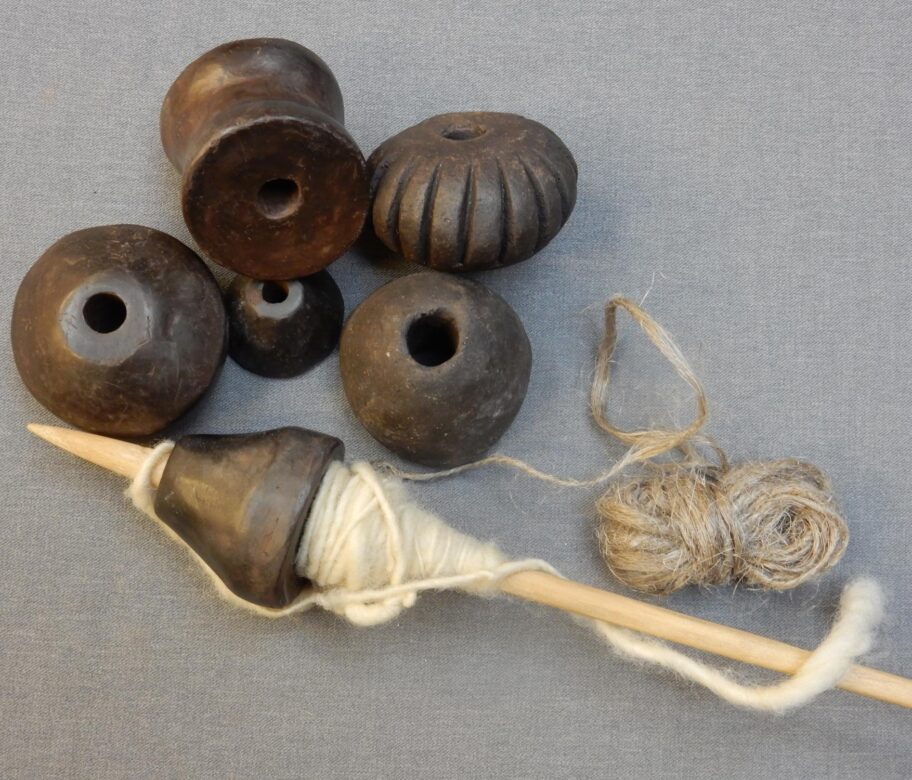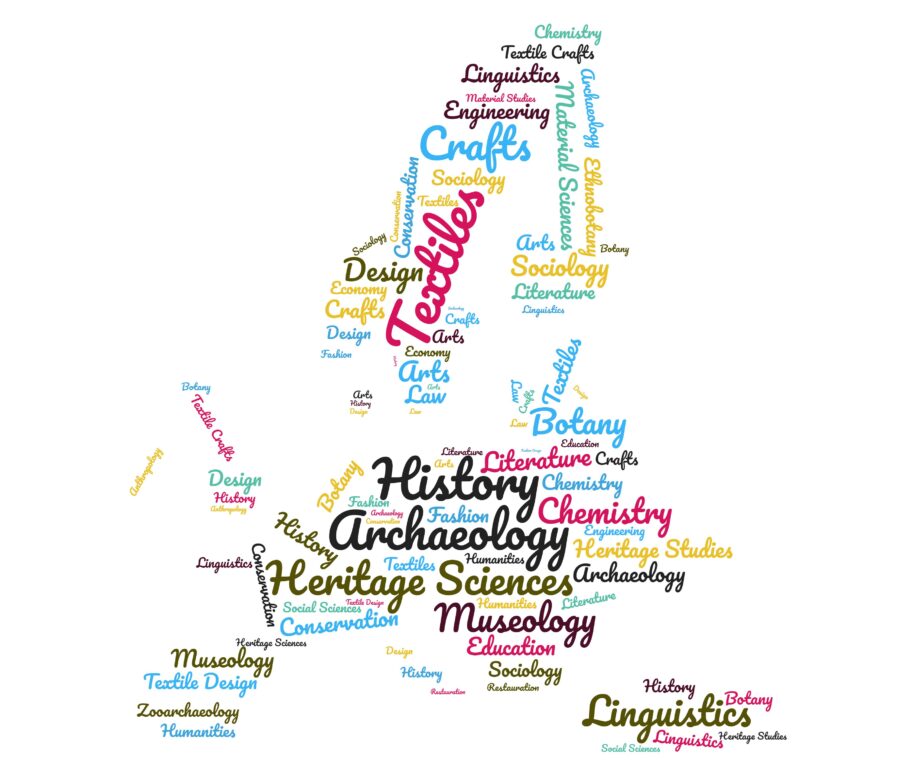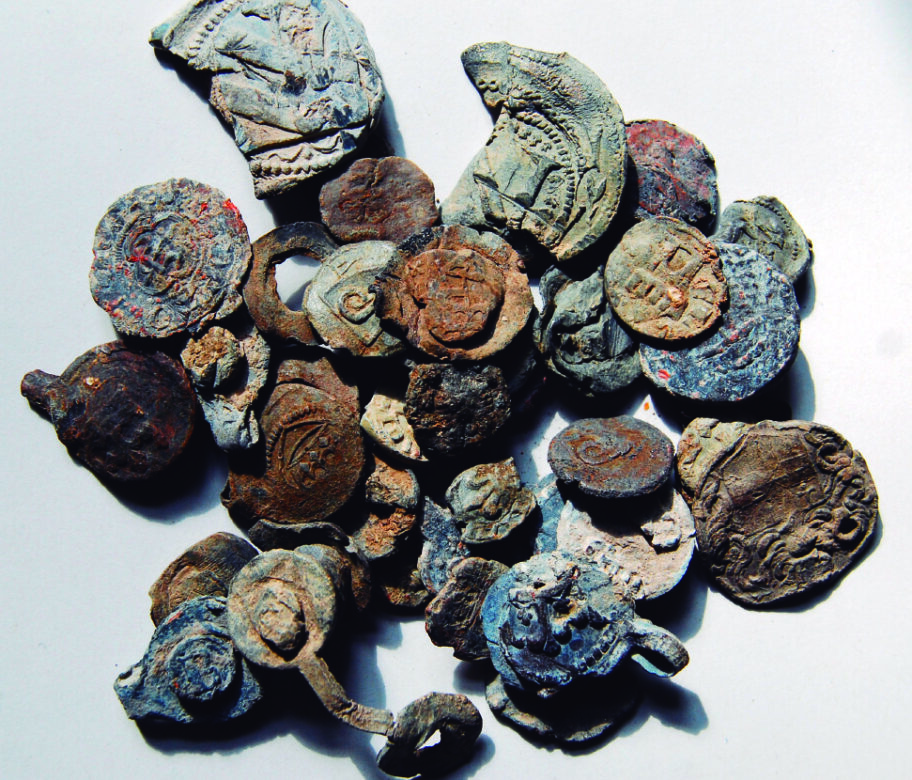
About EuroWeb
Textiles accompany us throughout life, from swaddling clothes to funerary shrouds, flexible and accessible materials through which we express gender, age, and status. As a techno-complex, textile crafts predate metallurgy and even pottery. European history and identity is shaped by this materiality and technology, and its manifestations in terminology, iconography and symbolism have an impact on the history and archaeology of Europe.
It is by no means a coincidence that the industrial revolution was sparked by the textile industries, changing European landscapes and speeding up production of this extremely time-consuming craft. Consequently, textiles became universal media of communication, exchange, and identity creation across epochs, cultures, social classes, technologies, markets, and genders. They bring people, bodies, and objects together, more than any other media or material.
The topic of textiles is universal. It comprises theoretical as well as material studies and scientific analyses. But the current approaches for understanding and appreciating textiles in European history do not respond well to the rational, linear treatments applied to other technical problems in science.
There are a number of challenges in textile research and as many ways of resolving them – each approached differently by the various stakeholders involved. EuroWeb seeks to challenge national and mono-disciplinary approaches which have dominated our understanding of textiles. It not only envisages collaborations among the traditional disciplines of history, philology, art history, archaeology, ethnology, and anthropology but also builds bridges between crafts practitioners, museum curators, designers, and artisans.
EuroWeb therefore delivers interdisciplinary, intersectoral research and training for a new generation of ECIs as members of an imaginative and innovative network. Textiles are a fundamental component of European material culture, which gives EuroWeb remarkable potential for outreach and knowledge sharing with all parts of society and with all parts of Europe, including the ITC. The scientific goal is to co-create a new textile-based interpretation of European history centred on sustainability, training the next generation of scholars with the interdisciplinary skills needed to address new fields of knowledge.
EuroWeb explores the whole geographical area of Europe. The chronological frame stretches from prehistory and into Industrialisation and the globalised textile trade. Major technological textile innovations came with new loom types c. 6000 BCE, with the exploitation of wool c. 3000 BCE, the invention of the spinning wheel 1300 CE, and the mechanisation of textile processes in the 18th century CE during the industrial revolution, which profoundly changed Europe and had a global impact. Textiles are not just clothing and furnishings but are also sails and sacks – used for transportation, storage and other domestic necessities. EuroWeb aims to investigate the cultural and socio-economic impact of textile production on agriculture, animal husbandry and the environment, and its role in craft organisation and production, in trade and communication, and in the construction of gender and individual and collective identities.

Presenting EuroWeb
COST Action CA 19131 Europe through Textiles: Network for an integrated and interdisciplinary Humanities (EuroWeb) aims at formulating a new vision of European history based on textiles: their massive production, trade, symbolic meanings, consumption, and reuse. It fosters a pan-European network of scholars and stakeholders from academia, museums, conservation, cultural and creative industries. Scholars from several disciplines of the Humanities (philology, art history, archaeology, history), Social Sciences (social anthropology, ethnology, economics, law) and Natural Sciences (geochemistry, conservation, chemistry, biology) join forces with craftspeople and designers to bridge current cultural, political, and geographical gaps and facilitate interdisciplinary research leading to inspirational material for the applied disciplines of fashion, art and design.
As a COST Action, EuroWeb promotes the integration of scholars and stakeholders from Inclusiveness Target Countries (ITC), i.e. countries that have not, so far, benefitted much from the EU research funding frameworks. It also addresses gender issues and works towards a gender balance amongst the participants, especially academics and researchers.
As concrete activities, EuroWeb offers theoretical and practical training schools, intense mentoring, targeted career development masterclasses for early career scholars and hosts international textile and dress conferences and workshops, especially in eastern Europe to highlight their collections, capacities, and scholarships. Deliverables include collaborative publications including EuroWeb Anthology, theoretical reflection and advancement, development of digital infrastructure, EuroWeb Digital Atlas, films and podcasts, and training and career development for ECIs.

Objectives
Textiles have been a central component of society for at least 10,000 years. We believe that a new vision and more nuanced understanding of the past will emerge when we employ textiles as a prism through which to explore the technology, economy, and culture of Europe. This will enable us to formulate and visualize a new view of how technology and terminologies developed in Europe, and how textiles and clothing became ultimate expressions of identity. The main goals of the EuroWeb are to be achieved by challenging the traditional views on the past by:
- Formulating a new vision of European history based on textiles;
- Uncovering the underlying structures connected to textiles in languages, technologies and identities;
- Bridging different theoretical and methodological approaches grounded in European scholarship, and testing and disseminating new analytical and multi-disciplinary methods;
- Identifying expertise across time in sustainable textile practices;
- Dissolving the traditional and often obsolete and obstructive dichotomies of practice and theory through a more integrated approach of disciplines and cultural institutions;
- Forging new notions of inclusive European identity based on a shared heritage and experience of textiles and as identity, a sense of belonging and social cohesion.
These objectives are to be achieved by scholarly work organized in four Working Groups (WGs), and two working teams devoted to the main deliverables of the EuroWeb: the Digital Atlas and EuroWeb Anthology.